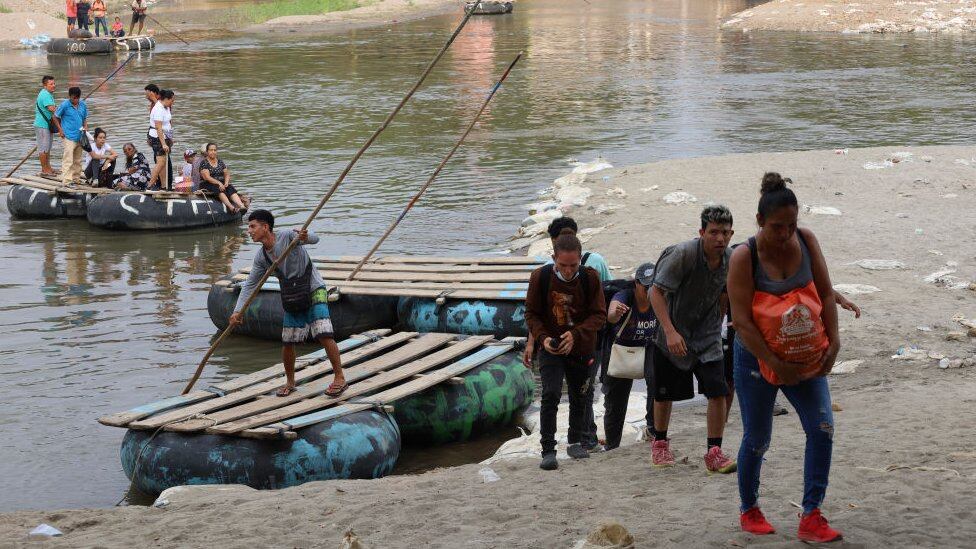
In Latin America and the Caribbean there are 23 million refugees, internally displaced or stateless people as a result of six major humanitarian crises that put the region in an unprecedented emergency, according to figures released by UNHCR on the eve of World Refugee Day.
The data is part of the annual report published on June 13 by the United Nations Refugee Agency (UNHCR), which this Wednesday and Thursday will hold in Bogotá, with the support of the Government of Chile, the Third consultation of the ‘ Cartagena +40′, in which countries from Latin America and the Caribbean will seek solutions for displacement also caused by disasters and the effects of the climate crisis.
The six crises that have increased the number of displaced people in the region are focused on northern Central America, a triangle formed by Guatemala, Honduras and El Salvador; in Nicaragua, Haiti, Colombia, Venezuela and Ecuador, explains the head of External Relations of the UNHCR Office for the Americas, Juan Carlos Murillo.
“Forced displacement in our region has become an unprecedented situation in terms of not only numbers but also complexity. Currently we have six major humanitarian crises that cross the continent and are generating large displacements“, the official told EFE.
Displaced people in Central America
According to Murillo, in the case of Guatemala, Honduras and El Salvador, due to the violence of organized crime and other factors, such as climate change, “More than a million people have been forced to leave their countries of origin and have become asylum seekers, refugees, internally displaced people or returnees with protection needs.”.
Nicaragua is also in the same region, “with more than 200,000 people who have been forced to flee their country mainly due to political issues and the human rights situation”.
The persecution of the Government of Daniel Ortega of its political opponents has also led it to withdraw the nationality of dozens of Nicaraguans, turning them into stateless persons, it points out.
“In third place is the situation in Haiti, with more than 580,000 internally displaced people and 800,000 people in need of international protection in different parts of the continent.“Murillo added about the crisis of political violence that the Antillean nation is experiencing. In addition, there are 5.5 million in need of humanitarian assistance.
Crisis in South America
Another crisis is in Colombia, where the persistent armed conflict causes “an internal displacement that affects more than 6.9 million people“to those who join”cross-border movements of Colombian people in need of international protection”.
Among the crises identified and addressed by UNHCR is also “the situation in Venezuela, with more than 7.7 million people who have left their country as refugees and migrants, of which 6.6 million are in Latin American and Caribbean countries”.
Finally there is Ecuador where in the face of insecurity and violence from organized crime “many people have had to move within their country or have crossed an international border in search of protection and security”.
According to UNHCR figures, of the 520,085 people who crossed the Darién Gap last year towards the north of the continent, Ecuadorians were the second nationality, with 57,250 migrants, surpassed only by Venezuelans, who were 328,650.
It is estimated that, if we add those who left Ecuador last year by air to the United States, some 75,000 Ecuadorians are in refugee or displaced status.
Cartagena +40
At the ‘Cartagena +40’ meeting, convened by UNHCR and the Chilean Government for this week in Bogotá, Latin American countries, civil society organizations, academics, the private sector and financial organizations will discuss behind closed doors the challenges of the region 40 years later of the approval of the Cartagena Declaration on Refugees.
This time the focus will be on refugees and displaced people due to climate change and natural disasters.
“We estimate that the number of internally displaced people will increase due to global warming, so the message is that we must combat climate change”said the head of the Disaster Displacement Platform Secretariat, Atle Solberg.
Source: Gestion
Ricardo is a renowned author and journalist, known for his exceptional writing on top-news stories. He currently works as a writer at the 247 News Agency, where he is known for his ability to deliver breaking news and insightful analysis on the most pressing issues of the day.











